The AMD Zen and Ryzen 7 Review: A Deep Dive on 1800X, 1700X and 1700
by Ian Cutress on March 2, 2017 9:00 AM ESTBenchmarking Performance: CPU Web Tests
One of the issues when running web-based tests is the nature of modern browsers to automatically install updates. This means any sustained period of benchmarking will invariably fall foul of the 'it's updated beyond the state of comparison' rule, especially when browsers will update if you give them half a second to think about it. Despite this, we were able to find a series of commands to create an un-updatable version of Chrome 56 for our 2017 test suite. While this means we might not be on the bleeding edge of the latest browser, it makes the scores between CPUs comparable.
SunSpider 1.0.2 [link]
The oldest web-based benchmark in this portion of our test is SunSpider. This is a very basic javascript algorithm tool, and ends up being more a measure of IPC and latency than anything else, with most high performance CPUs scoring around about the same. The basic test is looped 10 times and the average taken. We run the basic test 4 times.
Mozilla Kraken 1.1 [link]
Kraken is another Javascript based benchmark, using the same test harness as SunSpider, but focusing on more stringent real-world use cases and libraries, such as audio processing and image filters. Again, the basic test is looped ten times, and we run the basic test four times.
Google Octane 2.0 [link]
Along with Mozilla, as Google is a major browser developer, having peak JS performance is typically a critical asset when comparing against the other OS developers. In the same way that SunSpider is a very early JS benchmark, and Kraken is a bit newer, Octane aims to be more relevant to real workloads, especially in power constrained devices such as smartphones and tablets.
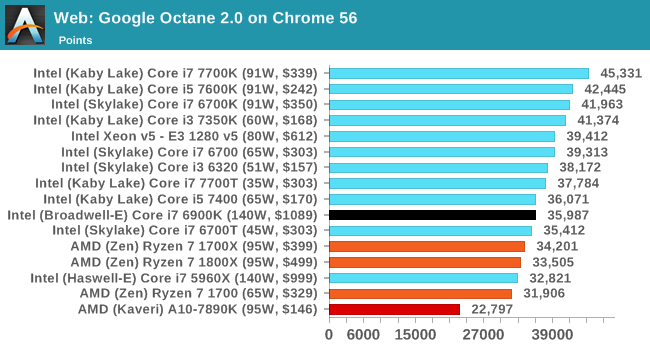
WebXPRT 2013 and 2015 [link]
While the previous three benchmarks do calculations in the background and represent a score, WebXPRT is designed to be a better interpretation of visual workloads that a professional user might have, such as browser based applications, graphing, image editing, sort/analysis, scientific analysis and financial tools. Web2013 is the older tool, superceded by Web2015, however both still are highly relevant for high-performance web applications today.
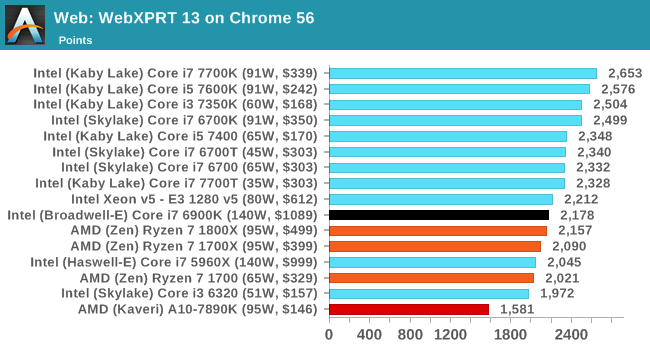
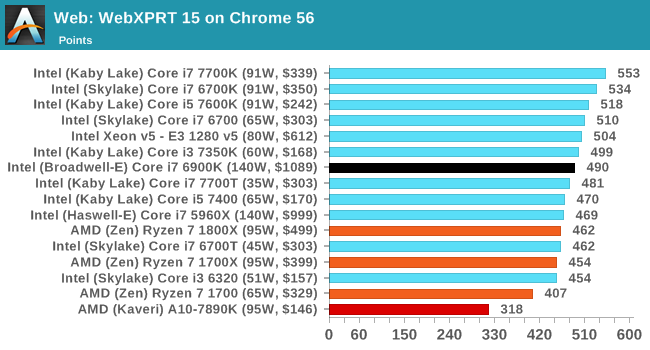


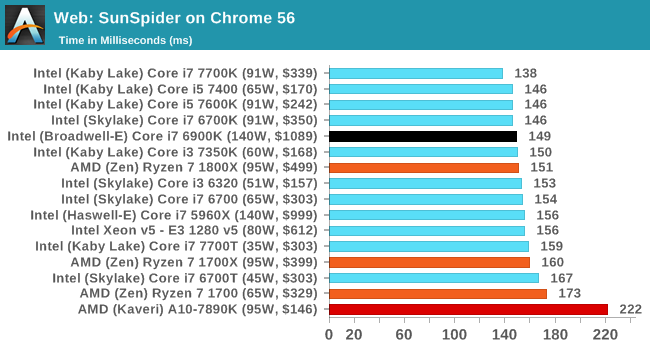
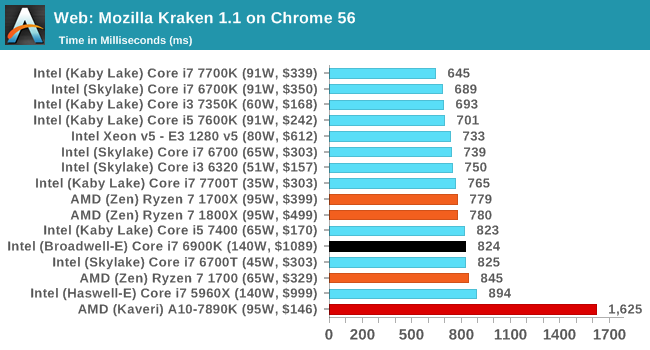








574 Comments
View All Comments
lakerssuperman - Thursday, March 2, 2017 - link
People like me. I was previously running a 2600k overclocked. Nice chip. Still runs great, but I was looking for an upgrade about a year ago as one of the things I do a lot of is Handbrake conversion for my HTPC. Going to even the newest Intel 4 core got me maybe 20% improvement on one of my major workloads for insane amounts of money and going to the high end to get 8-10 cores was just not justifiable.I ended up buying a used Xeon/X79 motherboard combo for around $300 off ebay. 8 cores/16 threads and it works great for Handbrake. I lost some clock speed in the move so single thread performance took a bit of a hit, but was more than made up for in multi-thread performance. I can still game on this CPU just fine and I don't play the newest stuff right away anyway just because of time constraints.
The X79 platform is fine for what I'm doing with it. Would I like the new stuff? Sure. And if I was in the position I was last year looking for an upgrade I don't see how I wouldn't get an 1800x. It gives me the right balance of features for what I do with my computer.
If I was just gaming, I'd look at Intel currently because their 4 core i5 is the sweet spot for this. But I'm not just gaming so this chip is infinitely more attractive to someone like me. With the price and features I can't see how it isn't a winner and when the 4 and 6 core parts come out at likely higher frequencies, I think they are going to be the real winners for gaming.
rarson - Thursday, March 2, 2017 - link
Ryzen is clearly well-suited to anyone who values high performance in a multitude of usage scenarios over one single usage scenario, especially if one cares about how much money they need to spend to achieve those results.injurer - Friday, March 3, 2017 - link
1800X is definitely designed for enthusiast, and AMD fans, but when you go to 1700X this is a price killer targeting the mainstream. 1700 is on the same boat but at even lower price. All the 3 are 8 core chips and are quite close to the 6900K but at 2-4 times lower price.At the end I really believe AMD are still having to show us the real potential of their architecture. Those chips are just the start. Remember Ryzen design is a new from its core, so they definitely have room to ecpand and enhance it.
bill.rookard - Thursday, March 2, 2017 - link
Well, thing to remember is that for those looking for a new build, they now have a legitimate choice. I still do see in the future that things will only go more multithreaded, and even though the i7-7700k is still a great chip, having more physical cores and resources to throw at it will only help.To that end, again, anyone planning a NEW build from the ground up will be able to seriously consider a Ryzen system.
Worst case, think about it. In the deep dive they had mention of 'competitive resource sharing' with SMT enabled. If you were to disable SMT on Ryzen - it would give you 8 PHYSICAL cores versus the 4 physical/4 logical cores of the 7700k. Without those resources being partially used across 16 threads - all resources would be allocated to the physical cores instead, potentially allowing more processing power per physical core.
There's still quite a bit to be checked out and dug through.
lilmoe - Thursday, March 2, 2017 - link
This. I want 2 things dug deeper in follow ups:1) Single/multi threaded performance with SMT disabled VS SMT enabled.
2) Game comparisons with more sensible GPUs (which actually ship and sell in volume, IE: the ones people actually buy), like the GTX 1060 and/or RX 480.
BurntMyBacon - Friday, March 3, 2017 - link
@lilmoeI agree with 1). Intel had HT for several generations before it was universally better to leave it enabled (still needs to be disabled some times, but these are more the edge cases now).
Not so sure I'm onboard with 2). Pairing a $200 GPU with a $500 processor for gaming purposes seems a little backwards. I'd like to see that (GTX1060 / RX480) gaming comparison on a higher clocked R5 or R3 processor when they are released.
Meteor2 - Friday, March 3, 2017 - link
I'd rather see tests paired with a 1080 Ti. At RX480/1060 level, it's well known the bottleneck is GPU performance not CPU. A 1080 Ti should be fast enough to show up the CPU.lilmoe - Friday, March 3, 2017 - link
@BurntMyBacon @Meteor2Lots of people, like me, are more into CPU power. I'm OK with a mid-range GPU. Gaming is not my top priority, and when I do, It's never above 1080p.
It'd be interesting to see if there are differences. I wouldn't dismiss it, saying the GPU would be the bottleneck so fast.
bigboxes - Sunday, March 5, 2017 - link
I'm with you on that. Gaming is way down in my priority list. I do it occasionally just because I love to see what my hardware can do. I currently have a ultrawide 1080p monitor. When I move to 4K then hopefully midrange GPU will cover that. My CPU is a 4790K. It's great for most tasks. I've been wanting to go to 6/8 core for some time, but the cost for the platform was too high. I think in a couple of years I will seriously think about Ryzen when building a new workstation.rarson - Thursday, March 2, 2017 - link
I am interested in seeing potential improvement due to BIOS updates. Additionally, I'm interested in seeing potential improvement due to better multi-threaded software. My hunch is that AMD is either on-par or better than Intel, or maybe damn near that prediction, so I think the 4-core parts will compare well to the current Skylake SKUs. I also expect them to overclock better than the 8-core chips. I guess we'll just have to wait for them to release.8 physical cores is definitely better than 4 cores with SMT/HTT/whatever you want to call it.